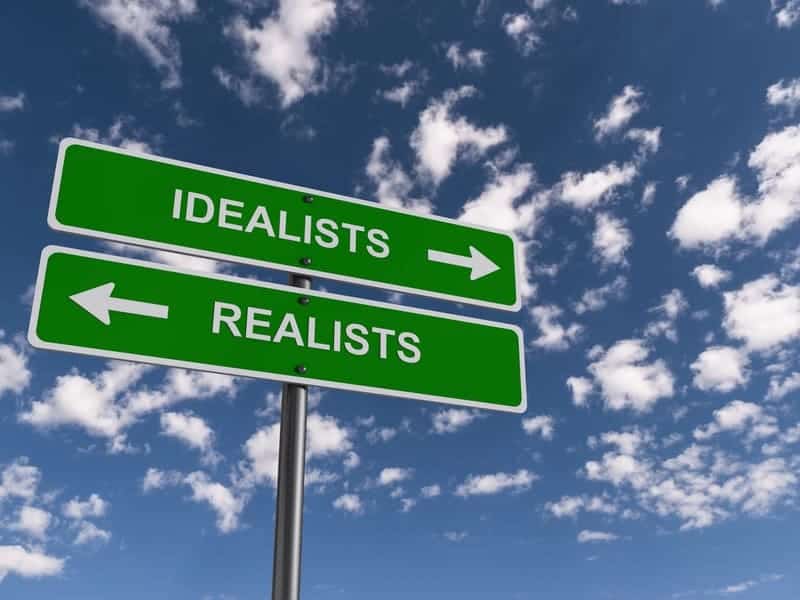Realism and idealism are two schools of thought that govern major actions in the way people conduct their lives.
Realism is a way of thinking realistically, believing in limited capabilities and not giving matters more importance than they deserve. Idealism, on another hand, is an exaggerated view on what we can and cannot do; the line of limitations turns from solid to blurred as we move from a realist’s perspective to an idealist’s.
Idealism has more than one definition and in this article we focus on its less abstract one: “a person who cherishes or pursues high or noble principles, purposes, goals, etc.”
In this article, I discuss the differences between these two schools of thought and their influence on romantic relationships. Of course, while we have hundreds of books centered around such topics, this article is a good starting point – an overview on the topic from a slightly high plane.
Main Difference between Realists and Idealists
It is very common for people to identify as realists, even more so for people to reject the idea of idealism.
Hence, the main difference between the two starts here: one is widely welcomed while another is, at least by the general public, socially rejected.
In common language, the realist is the person who settles for what he or she perceives is possible and not too absurd, whereas the idealist is the person who chases grandeur in moral and material matters.
If we are looking at the purely philosophical meaning of idealism, also known as Plato’s idealism, I illustrate the difference in a different manner.
Realists look at the actuality of things, whereas idealists consider reality to be a mental construct.
What makes you sure that you are not living in a simulation right now, programmed to see things the way only you see them and make far-from-objective observations about everything? A movie called ‘The Truman Show’ illustrates just how far from actual reality the reality we perceive can be.
Interesting Information on the Two Schools of Thought
Idealism was developed by Plato, whereas realism was established by Aristotle. As you might have already deduced, such great minds spending time and resources on such debates is a good indicator that there is more to the common views on these concepts.
While both are schools of thought studied for decades now, realism is also commonly used to refer to literature or art (that is, if you believe the two are different – I like to think literature is a high form of art in itself).
In arts, realism refers to works that represent things as they are, without exaggeration or imagination.
As for idealism, it is the sun for a wide lexical field that revolves around it – the mass that brings it all together. Words like ‘ideology’ and ‘ideal’ are commonly used, but their depth is seldom understood…
Are Idealism and Realism Mutually Exclusive?
Knowing both how complex human characters can be and how situational opinions really are allows us to easily answers this question. No, you are not either an idealist or a realist – you could be both and you could be neither.
A pessimist, for instance, is a person who always expects the worst turnout of events, and even it does not happen, finds a negative way to look at things and takes it up.
An optimist is the opposite of that – even when bad things happen, optimists seek the silver lining and find it in themselves to believe that there is a good reason for whatever happens.
Both optimists and pessimists are not realists; no life can be full of only good or only bad, and thus to reflect the reality that he or she lives in, one must see both the positive and the negative.
Nor are they idealists.. For a pessimist, the ideal is unattainable, and for an optimist, aiming for perfection is equivalent to planning for failure. As we have learned thus far, an optimist tries to avoid such disappointment.
Yet, being both is also common, but usually not simultaneously. Realism, ironically, transcends all boundaries and can refer to anything.
We often find ourselves to be realists about macroscopic objects, their properties and independence, and the givens in our everyday world, but non-realists when it comes to aesthetic and moral values.
As the previous paragraph might be a bit difficult to understand, consider the moon.
Realism starts with a claim of existence, followed by its independence.
This big silver sphere we see at nighttime is the moon, and it is independent from all objects around it – it is round and no one can refute that. Ideally, a realist stops here, whereas the idealist proceeds.
The idealist questions what the moon could be – it is more than a ball of rock; it has philosophical depth that the realist cannot reach, and this depth is subjective to every idealist who cares to look at it.
When we approach Plato’s definition of idealism, that deals with dismissing the concrete and focusing on the abstract, the conflict between realism and idealism becomes more pronounced.
The “real” is questioned and the “unreal” is welcomed. Still, that only applies to tangible things – ethics, aesthetics, virtues and values can have different views from the same subject, and this counters the mutual exclusivity of idealists and realists.
Realists and Idealists in a Relationship
As one person can be both realist and idealist, it would be clearly absurd to say that idealists and realists do not match.
I would even go so far as to say they complement each other, keep the balance where adventure and dreams are involved.
One can vividly depict an argument on whether the bed they sleep on is wood and cotton, or a tool they have created to share their love by remaining aside each other.
This factor is not a very urgent one, maybe 6th date material, but earlier is too soon. 😊
Is Being an Idealist Good or Bad?
As is the case with everything that transcends material value, goodness is difficult to measure in being an idealist. However, one can say that idealists have more room to shine given their dedication to test their limits and strive for perfection.
If only it were that easy… The higher the expectations, the bigger the possible disappointment. Thus, idealists should be careful with their mindsets.
In the metaphysical sense, where the external world is but a product of our minds, idealism can often be misleading and can give people a sense of paranoia and discomfort.
Still, the lack of strict boundaries – rules – gives man a sense of freedom that realists cannot comprehend and meaning to the imagination that realists do not make use of.
Fields in Which Realism and Idealism Surface
- Realism and idealism have been a hot topic in politics, particularly the American Diplomacy. For a more thorough understanding of their application, please check out the following website https://americandiplomacy.web.unc.edu/2011/04/idealist-vs-realist-foreign-policy/
- Realism and idealism have made their mark in the metaphysical world. One could claim that the realists got stuck at the physics part, and the idealists added the meta to it. Thanks Schrodinger!
- If you are looking to get your mind into an even bigger twist, please click on the link to visit the following website https://people.bss.phy.cam.ac.uk/~mjd1014/real.html
- Realism and idealism appear today in psychology and character assessment. They are specifically linked to projection and, brace yourselves for the biggest shocker of all, idealization. The reasons for that one are obvious, but it is still nice to point out the seriousness of the consequences of these concepts.
We can definitely find more domains in which the realism-idealism dispute plays a role.
A final valid interplay between realism and idealism, not general enough to make our list but enough to make our article, is introduced in Douglas Conant’s article about their contribution to leadership. For the whole read, please visit the website https://hbr.org/2012/01/the-power-of-idealistic-realis
A Final Word
Categories are utterly useless when it comes to matters of thought. You do not have to label yourself as a realist or idealist. In the meantime, understand your choices better and ponder the question of ‘what is reality?’
This will help you get a better outlook on your life and the lives of those around you. Idealism could help you become more understanding to the malleability of opinions and mentalities, and realism, well… realism keeps you sane!
References:
https://plato.stanford.edu/entries/realism/
https://www.qcc.cuny.edu/socialsciences/ppecorino/intro_text/Chapter%204%20Metaphysics/Idealism.htm



